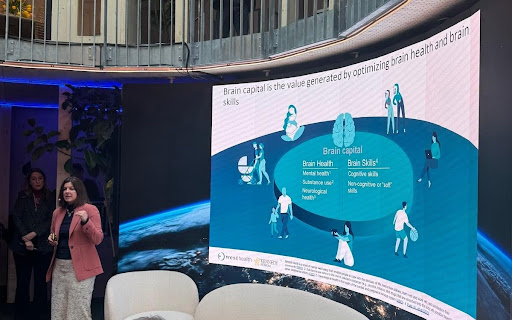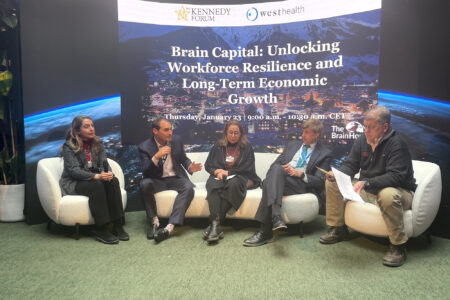During the World Economic Forum in Davos, brain health emerged as a “top priority” for world leaders, according to Forbes. Though brain health is broadly defined as optimal function of the brain, The Kennedy Forum and West Health led two sessions focused on how brain health can ultimately affect economic and public health outcomes.
At the newly launched Brain House, we explored two key topics, alongside experts from Bank of America, Gallup, KPMG, and McKinsey Health Institute:
- A Life-Course Approach to Brain Health for the Future
- Brain Capital: Unlocking Workforce Resilience and Long-Term Economic Growth
Read on to learn the insights and new ideas that were presented.

Organizations May Be Paying a Brain Capital “Tax”
The Kennedy Forum President and CEO Rebecca O. Bagley provided context on the emerging importance of brain capital, which describes the value generated by investing in brain health (mental and neurological health) and brain skills (like cognitive function).
A new analysis presented at Davos shows that a sample 10,000-person company that does not invest in its brain capital risks losing up to $22.2 million each year* in the brain capital “tax,” drawn from employee burnout, untreated depression or substance use, along with life factors like caregiving responsibilities that can dent peak productivity.
Fortunately, some businesses are already acting. The World Economic Forum released the 2025 Future of Jobs Report, showing that 64% of employers see supporting well-being as a key strategy for increasing talent availability. During the sessions, KPMG noted a three-tiered approach: offering employee assistance programs, evaluating how the company works, and reducing stigma by making MH a part of everyday conversations.
“The business community is taking up the cause of advocating for better public policy on mental health. They are monetizing all of the value that can be gained from better interventions in brain health. If the business community carries the case, maybe we can carry the day.” – Patrick J. Kennedy

Mental Health Is an Issue Inside and Outside the Office
Gallup released new data at Davos as part of its partnership with West Health showing that 34% of people report being concerned that mental health conditions could limit their careers and earning potential, while only 38% of people believe their employer is doing enough to support their mental health. Additionally, Gallup found that employee engagement and overall life satisfaction hit a record low in 2024.
This is not an isolated problem among a few employees. New data analysis at Davos shows that The majority of the global workforce is affected by at least one factor that reduces brain capital**. If the global workforce were 100 people:
- Up to 1/3 may have a mental illness, a substance use disorder, or both
- Half are experiencing symptoms of burnout
- Nearly 20% feel they have a toxic workplace
These concerning indicators highlight how mental health permeates our lives personally and professionally, and leaders must act accordingly.

Mental Health Is Essential Through the Life Course
Brain health is particularly important as demographics shift to older populations in the U.S., where 1 in 4 adults will be older than 65 by 2060. Leaders from West Health pointed out that every 8 seconds, someone turns 65, and by 2034, older Americans will outnumber children for the first time.
It is essential that understand the discrete needs of individuals — and seek evidence-based, best-practice treatments for each age group, from the key years during childhood and adolescence, through our increasingly longer lifetimes.
“People are living longer; they are not necessarily living better. Aging is not just the years in your life, but the life in your years. It is time for us to focus on the life in those years.” – Shelley Lyford, CEO and Chair, West Health.
There Is Great Opportunity
Davos issued a clear call-to-action on brain health as a key component of our shared success in the future, but it also offered an opportunity to accelerate efforts to reach 90-90-90 by 2033. If you would like to learn more about how we will get there or how your workplace can embrace best practices and policies for better mental health care, stay connected to The Kennedy Forum.
* United Nations, Patel et al (2018), WEF, WHO
** NIMH, SAMHSA, NIDA, Caregiver.org, United Nations, Patel et al (2018), WEF, WHO, APA, NAMI

